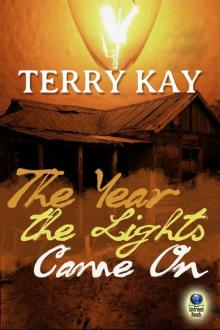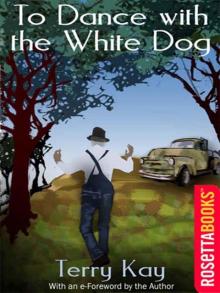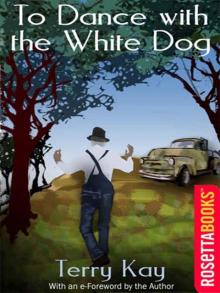To Dance With the White Dog Read online
Page 2
“It’s late, Daddy. I think you’d better go to bed,” his son said. The voice of his son was baritone and gentle, an orator’s voice.
“What time is it?” he asked.
“A little after one,” his son answered.
“That late?”
“Yes.”
He had slept remembering her dying, and he did not know it. He thought again: It does not take long to die.
“The others are here,” his son said.
He turned his head toward the kitchen door. His other children were cuddled, touching one another, staring at him. His children seemed very old to him.
“We’re all about to get settled in for the night,” his son told him. “Some of us will be here with you. We just wanted to say good night.”
He nodded and pulled himself forward in the chair and caught his walker with his hands. His son helped lift him. He could feel a burning in his bad leg.
“Do you hurt?” his son asked.
“A little.”
“You want something, Daddy?” asked one of the daughters.
“I gave him some aspirin,” another daughter answered.
“I’ll be all right when I get to bed,” he said.
“We’ll get the doctor to give you something stronger tomorrow,” his oldest daughter said forcefully. “He’ll do that.”
He stood leaning against his walker. He could hear the static of the swamp bugs, but not the whippoorwill. There was a pause, an uncomfortable lapse of time, an off-beat hesitation. His oldest living son embraced him. “We love you,” his son whispered. And they all came to him, bending across his walker, each embracing him, each mumbling to him, each stepping away, back into the cuddling of the group.
He looked at them. He could feel his head nodding. He said, almost numbly, “We’ll miss her.”
One of the daughters cried very suddenly, “Mama! Mama!”
2
There were many flowers at her funeral and many people, and he believed she would have approved of the service, though, for him, the preaching in the eulogy was a message of panic rather than promise—“Everybody’s going to die. Get ready for God now, while there’s time. O sinner, nobody knows the time. Nobody knows but Jesus. Amen. Amen. Amen.”—and he tired of the singing trio with its off-key whine conjuring up images of angels and an old rugged cross and a gathering at the river.
He had always missed her intensely when crossing rivers, going away to work in other places. The rivers had been a ground rip in the space that separated them. Yes, we shall gather at the river. Gather. But why? Gather to wait? Gather to stare across? Gather to hear the waters rushing?
He wanted to touch her face.
“Remember this day,” the Preacher said to him and to his sons and daughters and grandsons and granddaughters. “Remember the passing of this loved one.”
On the night of her death, he had taken from his desk the journal that he kept daily and he had written:
Today my wife died. We were married 57 good yearsj.
It was the simplest entry he had ever recorded.
He would not forget the day. The Preacher would. But he would not.
He was led from the sanctuary of the funeral home where the service had been performed (her desire) to the car of his oldest living son and was driven to the gravesite where his oldest son—not living, but dead—had long been buried, and there he listened to a final, toneless litany. The Preacher paused before him, bowed just so at his gravesite chair, offered a handgrip and supplicant mutterings, and then moved to his sons and daughters, repeating himself like a parrot.
“Let’s go home, Daddy,” one of his sons said.
“In a minute,” he replied.
The coffin was before him, balanced on strong nylon straps like a prop in an aerial act. A blanket of roses covered the chest of the coffin. He looked at the dug grave and, beside it, the grave of his oldest son—smooth mound, brilliantly white, glittering with mica dust—and he wanted to be alone. He could feel a hand on his shoulder.
“All right,” he said softly. “All right.” He stood at his walker. He could sense eyes staring at him. “Goodbye,” he said to the coffin. He turned on his walker and moved away.
It was a day of sun—warm, bright, a soft wind from the west. The earth was green. The sun felt good on his face and hands.
In the afternoon, he took the druggist’s pill and went into his bedroom and slept and dreamed of Neelie, the Negro woman who had worked with his wife. In his dream, Neelie was sitting beside his wife’s coffin, talking to it. “I’ll put up the beans. Don’t you worry none. And cook up the biscuits, just like you been doing. Don’t you worry none about it, none at all. I’ll be around, taking care.” And from the coffin, in a voice from the roses, his wife answered, “Put his water glass on the table, Neelie. Put ice in it. He likes it that way. And salt and pepper. He’ll be asking for his salt and pepper.” And Neelie said, “Oh, yes, I will. All them things. Don’t you go worrying none. You just go on over and don’t be worrying none about it. Neelie’s here.”
When he awoke he could hear voices through the walls of the bedroom. The house is still crowded, he thought. The church committee of women, there to clean and cook and grieve, would still be placing food on the tables and there would still be buffet lines of visitors picking at the sorrow feast. He wondered if Neelie was there, with them, telling them what needed to be done. Neelie had rushed into the house when she learned of his wife’s death, had stormed loudly inside, shoving past children and grandchildren, and had embraced him with a squealing cry of torment. “Don’t you worry none,” she had said in a wail. “Neelie’s here. Neelie’s here.”
He could hear the smaller grandchildren outside, playing.
“Patty’s it.”
“No, she’s not. Patty’s already been it. Greg’s it.”
At the funeral home, one of his daughters had said, “This is only the second time we’ve all been together, in the same room. The first time was the anniversary. You remember, Daddy? The fiftieth anniversary for you and Mama?” And the funeral director had asked—for the obituary notice—how many grandchildren there were in the family. No one knew, and so the director had taken his pen and written down the name of each child and that child’s husband or wife in parentheses, oldest to youngest, and the number of children each couple had. The children were Alma (Hoyt), Lois (Tabor), Sam, Jr. (Melinda), Kate (Noah), Carrie (Holman), Paul (Brenda) and James (Saralyn). When the director added the number of grandchildren, the number had been twenty-eight.
“You’d think somebody would know how many grandchildren there are,” Sam, Jr. had said.
“Mama did,” Lois had answered. “She was the only one.”
* * *
He did not leave his bed until late, after the visitors and the church committee of women left. He ate a bowl of soup (made by Neelie; she had remained) and listened to his daughters speak of house-cleaning. He knew he could not object, though the house-cleaning was only part of it. They would want to watch over him now, hovering. For a time, at least. They would want to study him, like an uncertain experiment. They would want to know if he could care for himself. If he could not, they would want to say what should be done for him.
“We won’t be in the way, Daddy. We just want to get things straightened up.”
“There’ll be a lot of thank-you notes to write. We’ll take care of that.”
“Anytime you get tired of us, you can just tell us to leave.”
“Daddy, you think you’ll be all right here by yourself?”
In his journal, late at night, he wrote:
This is the saddest day I have lived in my 81 years. My wife of 57 years was buried today beside our son, who died in 1941 as a result of a truck accident when he was hitchhiking to take a job. She has longed for him all these years and now she is with him. I know they are embraced in happiness. Today ended for me a lifetime of joy and I am grateful to the Almighty for giving me the wife I wanted and the children
we both wanted. Times were not always easy and I wished often that I could provide more than I was able to, but I can say that we had things that money could not buy. I will miss seeing her face and hearing her voice and knowing she was always there close to me. She has crossed a river from me that I must wait to cross before I see her again. When I see a river, I will think of her. All of our children have been here. They are very kind.
Again he took the druggist’s pill and again he dreamed of her. She was in the kitchen, at the cabinet counter, kneading dough. Two of their daughters were with her in the kitchen, working.
“He’ll be marrying again when I go. You’ll see. He’ll be marrying again. Find him some woman to come in here and do the cooking, some woman to take care of him. You’ll see.”
“Mama, don’t say that.”
“You don’t know him. I do. You’ll see. Somebody else’ll be living here, making him biscuits with my biscuit cutter, three times a day.”
“Is that right, Daddy?”
“That’s right. But she won’t have to cook a lick. Gonna find me a woman from one of them leg shows out in Atlanta.”
“Daddy!”
“He will, too. Find some old woman, hiking her skirts. Maybe Sybil Hillard. She’s had her eye on him twenty, thirty years. Used to come around at the canning plant when your daddy was running it. Didn’t know beans about canning. But he’d do it for her. Didn’t think I noticed, but I did.”
“Mama, that’s just being silly. Sybil Hillard’s one of the nicest women around here. She’s got a husband. They must have been married forty-five years.”
“You don’t know her like I do. I remember her at the canning plant.”
“Daddy, is that so?”
“I don’t remember Sybil Hillard ever being at the canning plant.”
“See, Mama.”
“But she’s a fine-looking woman, all right.”
“Daddy, stop it!”
“Let him go on about her. I don’t care. You wait and see. You just wait and see. There’ll be somebody here making biscuits.”
He awoke with the dream still clear in his mind. He smiled easily. The dream pleased him.
3
His daughters returned the following day to clean the house, and Neelie was there, also—not because she had been asked, but because she insisted and none of his daughters knew how to object.
“How can you tell her she’s not needed?” they said among themselves. “She thinks she’s got the right to be here. Ask her. She’ll tell you. She’ll tell you she’s been around longer than any of us, helping out when Mama needed her.”
And: “She’ll be telling us what to do, that’s for sure.”
And: “I guess she will. She always has.”
And: “Seems to make Daddy feel better, having her here.”
And: “Maybe she thinks we’ll be taking things out of here without her permission.”
He did not stay in the house with his daughters and Neelie. He got into his truck and drove it to the edge of the field and got out of the truck and began to work in the small nursery plot of pecan trees, pulling away weeds, laboriously pushing himself from tree to tree with his walker. He thought of himself as an ancient turtle, dragging in inches across the crust of topsoil, legs clawing and legs pushing, stopping, resting, moving, resting again. But it did not matter. He was at peace in the nursery plot. Once he had had acres of trees growing out for the selling, but now there were only a few rows. She had not wanted him to plant them, but he had. “No need of it,” she had said. “You can’t get about on that walker as it is. Can’t take care of them. No need of it.” And he had argued, “I’ll go easy with it. Just put out a few, just enough to have some on hand if people want them.” But he had known, even when he planted the seeds, that the trees were for him, not for people who may want them. He liked the growing of them, liked the surgery of budding and the smell of the wood and the pruning of limbs. “They’ll be the last,” he had promised, and she had scowled at his stubbornness. She had said, “You get to hurting, and see if I run off to get you some medicine. No sense in it. You got trees all over this county. No need to be growing any more.”
He moved along the row of trees, setting the walker, leaning his weight onto it, feeling the walker sink into the topsoil, slowly, slowly moving, pulling at the dead weeds of winter and the new, tender weeds of spring, shaking the soil from roots of the new weeds, throwing the weeds, roots up, into the middle of the row to wither in the sun.
He looked back down the row, at the peculiar tracks he had made—the single, hard footprint, the four punch-holes of the walker. He looked at the slender stalks of the trees, at the pulled grass in the row’s middle. He had not moved more than fifty feet in two hours. Old turtle, he thought. Going nowhere slow. The sun gathered like a pillow in his hat and across the bridge of his shoulders.
At lunch he would take the druggist’s medicine and sleep, but he did not want to be in the house now, not with his daughters and Neelie rummaging like thieves through cabinets and closets and drawers, filling boxes to be carried away. They would take away much of her in the trunks of their cars, leaving just enough for her to be vaguely present. A jewelry box. A robe in a closet. A hat for Sundays. Slippers. A shoe carton of letters. Enough for him to see her in rooms, like fragments of telltale clues in a shallow mystery. But there was no mystery. She had died, and his daughters—their daughters—and Neelie were removing her, room by room. They would work quickly, he thought, agreeing among themselves that it was best for him not to see what they were doing. And he would not question them. It was their ritual—a rite of daughters. And of Neelie. Neelie deserved to be there. Neelie knew the house better than any of them.
He stood upright and stretched the muscles of his back and then took his handkerchief and rubbed the perspiration from his forehead and eyes and from the band of his hat. Then he fanned his face with the hat.
There would be only one place his daughters and Neelie would not clean, he reasoned: his desk. The desk was private. None of them had ever opened his desk or asked about its contents. “Don’t bother the desk,” she had warned their children. “That’s your daddy’s. Leave it alone.” And their children had obeyed and had passed the warning to their children and they, too, had obeyed.
The desk contained his records and letters and journals. The records and letters and journals contained his history, and hers and the history of their children, written in the shorthand of days and seasons and years. Children born. Dates, names, weights. Measles and chicken pox and mumps and broken bones. Date occurred, date healed. Year by year. The planting of crops, with free-hand drawings of contour maps. Year by year. Date planted, date harvested, yields, prices, net-from-gross sums. Cow names, cow breedings, calves dropped, calf names. Tree seeds planted, trees budded, trees sold. Droughts. Freezes. Gain, loss. Gain, loss. Year by year. His letters and records and journals were like orderly albums of photographs—words in odd, staring poses. But no one had ever opened his desk or asked about its contents.
He could hear the sharp clap of a door closing, and he twisted his weight on the walker, propping on his good leg, and looked toward the house. Neelie was crossing the yard in a long stride, her arms swinging in exaggeration like a triumphant swim stroke. She has them doing what she wants done, he thought. Exactly. Neelie was in command. It was in her walk, in the erect carriage of her slender, tall body, in the polished, hard blackness of her face. Neelie was in charge of the house-cleaning and his daughters were helpless to stop her.
Neelie crossed the road and followed the path under the orchard of pecan trees near the field. She stopped at the edge of the pecan rows. Neelie had worked most of her life in the fields. On her sixtieth birthday she had vowed never again to walk into one.
“Not even if Jesus told me to,” she had said defiantly.
“You come on to the house and eat you something,” she called in her high, shrill voice. He waved his hand and nodded.
“Don’t you go
pulling up no more of them weeds,” Neelie ordered. “Too hot out here for old folks like me and you. You get yourself back inside before you go falling out. Lord, Jesus, Neelie can’t lift you up, you go falling out.”
He waved again and turned carefully on the walker and began to move back down the row, over the pulled, withering grass. Neelie stood watching him, arms crossed. She was talking rapidly (scolding him, he guessed), but he could not hear what she said. He knew it would be useless to argue with Neelie. She would badger him with her voice until he surrendered. And it was hot. And he was tired. Neelie watched him until he reached the end of the row and his truck. “You need some help?” she asked in a loud voice.
“No,” he said.
“Lord, Jesus, I swear you gon’ kill yourself in that old truck,” she complained. She shook her head in disgust and began striding back to the house.
He lifted the walker and put it into the bed of the truck and, holding to the door handle, pulled himself up into the cab. No one trusted his truck, or him in it. He did not have a driver’s license, but he did not care. The truck was a grand possession—old, paint bleached to the metal and the metal stained with rust. Its motor banged, parts hammering against parts. Its gears were loose.
“What gear you got it in, Daddy?” his sons and daughters would ask.
“I don’t know. One that moves,” he always answered.
The truck jerked like an animal shuddering under its skin. But it was his truck. His. He could no longer walk over his land, and the truck carried him, two sluggish old things getting about. Let them snicker and shake their heads in pity. It was his truck, by God, and he loved it. And his grandchildren loved it. His grandchildren were always pestering him to take them for rides.
He did not inspect the house or ask his daughters about the boxes stacked on the sideporch. He went into the kitchen and sat at the table where Neelie and Lois and Carrie were sitting, polishing silverware. Alma and Kate were clearing cabinets, stacking the contents on the counter.

 The Year the Lights Came On
The Year the Lights Came On To Dance With the White Dog
To Dance With the White Dog The Book of Marie
The Book of Marie After Eli
After Eli To Dance with the White Dog: A Novel of Life, Loss, Mystery and Hope (RosettaBooks into Film)
To Dance with the White Dog: A Novel of Life, Loss, Mystery and Hope (RosettaBooks into Film)